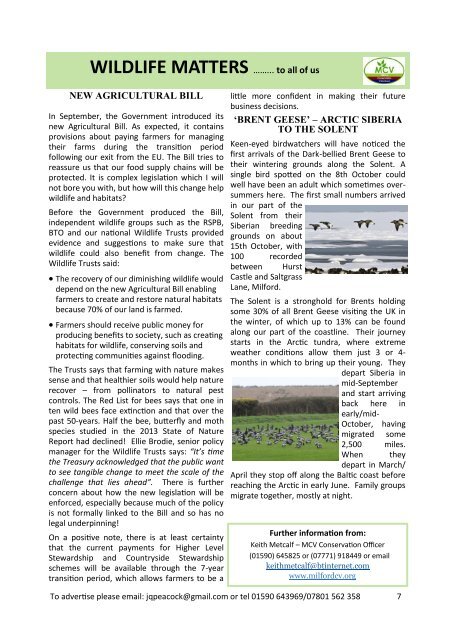You also want an ePaper? Increase the reach of your titles
YUMPU automatically turns print PDFs into web optimized ePapers that Google loves.
WILDLIFE MATTERS ……... to all of us<br />
NEW AGRICULTURAL BILL<br />
In September, the Government introduced its<br />
new Agricultural Bill. As expected, it contains<br />
provisions about paying farmers for managing<br />
their farms during the transition period<br />
following our exit from the EU. The Bill tries to<br />
reassure us that our food supply chains will be<br />
protected. It is complex legislation which I will<br />
not bore you with, but how will this change help<br />
wildlife and habitats?<br />
Before the Government produced the Bill,<br />
independent wildlife groups such as the RSPB,<br />
BTO and our national Wildlife Trusts provided<br />
evidence and suggestions to make sure that<br />
wildlife could also benefit from change. The<br />
Wildlife Trusts said:<br />
• The recovery of our diminishing wildlife would<br />
depend on the new Agricultural Bill enabling<br />
farmers to create and restore natural habitats<br />
because 70% of our land is farmed.<br />
• Farmers should receive public money for<br />
producing benefits to society, such as creating<br />
habitats for wildlife, conserving soils and<br />
protecting communities against flooding.<br />
The Trusts says that farming with nature makes<br />
sense and that healthier soils would help nature<br />
recover – from pollinators to natural pest<br />
controls. The Red List for bees says that one in<br />
ten wild bees face extinction and that over the<br />
past 50-years. Half the bee, butterfly and moth<br />
species studied in the 2013 State of Nature<br />
Report had declined! Ellie Brodie, senior policy<br />
manager for the Wildlife Trusts says: “It’s time<br />
the Treasury acknowledged that the public want<br />
to see tangible change to meet the scale of the<br />
challenge that lies ahead”. There is further<br />
concern about how the new legislation will be<br />
enforced, especially because much of the policy<br />
is not formally linked to the Bill and so has no<br />
legal underpinning!<br />
On a positive note, there is at least certainty<br />
that the current payments for Higher Level<br />
Stewardship and Countryside Stewardship<br />
schemes will be available through the 7-year<br />
transition period, which allows farmers to be a<br />
little more confident in making their future<br />
business decisions.<br />
‘BRENT GEESE’ – ARCTIC SIBERIA<br />
TO THE SOLENT<br />
Keen-eyed birdwatchers will have noticed the<br />
first arrivals of the Dark-bellied Brent Geese to<br />
their wintering grounds along the Solent. A<br />
single bird spotted on the 8th October could<br />
well have been an adult which sometimes oversummers<br />
here. The first small numbers arrived<br />
in our part of the<br />
Solent from their<br />
Siberian breeding<br />
grounds on about<br />
15th October, with<br />
100 recorded<br />
between Hurst<br />
Castle and Saltgrass<br />
Lane, Milford.<br />
The Solent is a stronghold for Brents holding<br />
some 30% of all Brent Geese visiting the UK in<br />
the winter, of which up to 13% can be found<br />
along our part of the coastline. Their journey<br />
starts in the Arctic tundra, where extreme<br />
weather conditions allow them just 3 or 4-<br />
months in which to bring up their young. They<br />
depart Siberia in<br />
mid-September<br />
and start arriving<br />
back here in<br />
early/mid-<br />
October, having<br />
migrated some<br />
2,500 miles.<br />
When they<br />
depart in March/<br />
April they stop off along the Baltic coast before<br />
reaching the Arctic in early June. Family groups<br />
migrate together, mostly at night.<br />
Further information from:<br />
Keith Metcalf – MCV Conservation Officer<br />
(01590) 645825 or (07771) 9<strong>18</strong>449 or email<br />
keithmetcalf@btinternet.com<br />
www.milfordcv.org<br />
To advertise please email: jqpeacock@gmail.com or tel 01590 643969/07801 562 358 7


















